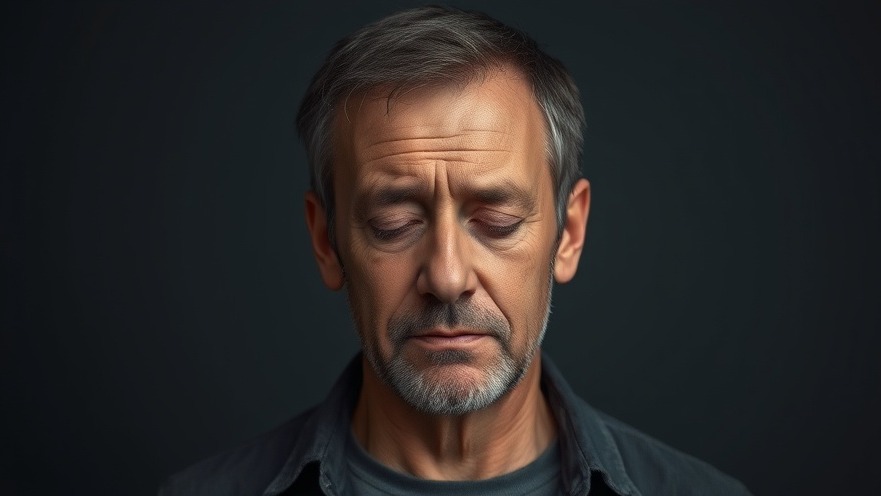
The Shocking Impact of One Night Without Sleep on Your Body
In a world where busy lifestyles often rob us of crucial sleep, the aftermath of a single bad night can be surprisingly deleterious to our health. In the insightful video, One Night of Bad Sleep Does This to Your Body, the discussion underscores the profound effects, including diminished cognitive functions, mood disturbances, and increased stress levels. However, these short-term fallout effects may also hint at deeper, more chronic issues, particularly as we age, making sleep an essential yet often overlooked part of our overall health strategy.
In the video One Night of Bad Sleep Does This to Your Body, the discussion explores the significant impacts of sleep deprivation on health, raising important points that necessitate a deeper analysis.
The Importance of Sleep in Cognitive Health for Seniors
The importance of sleep for cognitive health in aging cannot be overstated. As we age, our sleep patterns naturally shift, and many seniors experience sleep disturbances that can aggravate anxiety, depression, and cognitive decline. Research indicates that insufficient sleep diminishes our ability to manage stress effectively and can lead to serious consequences in a senior's mental wellness. To combat these adverse effects, maintaining good sleep hygiene is essential. This includes creating a calming bedtime space and establishing a consistent sleep schedule to align with our body's natural circadian rhythms.
Exploring Natural Remedies for Better Sleep in Older Adults
For seniors battling insomnia, a plethora of natural sleep remedies can significantly enhance sleep quality. Techniques such as yoga for mental wellness and tai chi for relaxation offer gentle exercises that can calm the mind and ease anxiety before bedtime. Harnessing the power of aromatherapy—with scents like lavender and chamomile—can further promote relaxation. Additionally, herbal teas and supplements such as melatonin or magnesium can provide a gentle assist to sleep cycles, making them safer alternatives for seniors compared to over-the-counter sleep aids.
Mindfulness and Meditation: Keys to Improving Senior Sleep
Incorporating mindfulness exercises for seniors into nighttime routines has shown tremendous potential in enhancing overall sleep quality. Techniques like deep breathing exercises and guided imagery for sleep can reduce nighttime anxiety and help ease racing thoughts at the end of a long day. Furthermore, meditation has gained popularity among seniors as an effective strategy to improve mental wellness. A simple nightly gratitude practice can not only improve sleep but also boost mental health, providing a soothing way to transition from the hustle and bustle of the day.
The Role of Social Connection on Sleep Quality
Loneliness and social isolation are prevalent issues among seniors that can severely disrupt sleep patterns. Engaging in social activities not only helps to bolster emotional health but also positively influences sleep quality. Support groups and mental health workshops can provide invaluable community connections, lowering the levels of cortisol, the stress hormone, which is often linked with poor sleep. Hence, maintaining social bonds is an essential component not only for emotional wellness but also for fostering better sleep.
Practical Insights: Building a Better Sleep Routine
Improving sleep quality, particularly for older adults, often starts with simple changes to promote a calming environment. Creating rituals such as calming activities before bedtime provides a natural cue for the body to wind down. Limiting screen time and caffeine intake in the evening hours, combined with regular walking for mental clarity during the day can also significantly boost overall health and maintain a steady sleep schedule. Moreover, innovative sleep tracker apps for seniors can help identify patterns and encourage better practices to achieve restful sleep.
Understanding Sleep Myths: What Seniors Need to Know
Many misconceptions surrounding sleep often impede seniors from taking charge of their sleep health effectively. One common myth is that older adults need less sleep than younger people. However, quality sleep remains critical at any age. Debunking such myths is vital for empowering seniors with awareness and strategies to combat sleep challenges, from recognizing the signs of sleep apnea to understanding the importance of deep REM sleep.
Conclusion: Prioritizing Sleep for a Healthy Mind and Body
Living a fulfilled life in older age requires a proactive approach toward mental and physical wellness, with sleep as a cornerstone. The tips for improving sleep in elderly folks—ranging from meditation to engaging socially—underscore the interconnectedness of sleep and mental health. Prioritizing restful sleep can lead to significant improvements in overall quality of life, enabling seniors to approach each day with renewed vitality and mental clarity.
 Add Element
Add Element  Add Row
Add Row 



Write A Comment